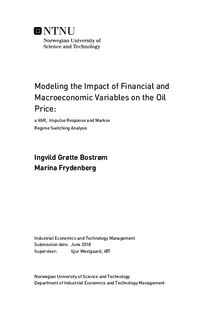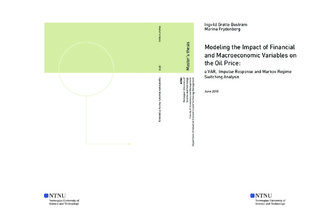| dc.description.abstract | Oil is of great importance for the world economy, as it is the worlds largest contributor to the global energy consumption. The oil price movements are closely monitored because a sudden drop can cause ripples through the economy. A wide range of studies have been conducted on the many factors that influence the oil price, such as supply and demand, but just as important is the significance the financial- and macroeconomic factors have on the oil price.
In this thesis we address the impact of financial- and macroeconomic variables on the oil price. The time series assessed in our analysis are industrial production, interest rate, exchange rate, VIX, Baa-Aaa credit spread, S&P 500, as well as the oil price. We perform prerequisite testing for stationarity, cointegration, and structural breaks on the dataset. Based on the results from the preliminary tests, we identify a Vector Autoregressive- and Markov regime switching regression models as a good fit for this study. The Impulse response function evaluates the effects of the shocks from the variables on the oil price generated on the basis of the Vector Autoregressive model. Extending our analysis, we employ a Markov switching regression model on the time series to investigate the changes in the oil price between the high and low volatility states. Both models are adjusted to account for seasonality, stationarity and optimal lag selection.
Our results suggests that VIX, industrial production and exchange rate have the most significant impact on the oil price. VIX affects the price of oil negatively in both regimes. This finding is particularly interesting, as the relationship between VIX and oil price has not received much attention in the literature previously. We also find that the oil price responds negatively to the Baa-Aaa credit spread, the exchange rate and the S&P 500 index. Furthermore, it is evident that industrial production has a positive impact on the oil price. How the oil price responds to the interest rate is not certain, as the models show inconsistent findings. | |

